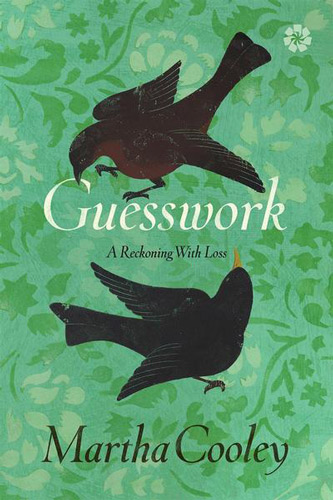Guesswork
Martha Cooley’s first book-length collection of essays, Guesswork: A Reckoning with Loss, is premised on the fact that eight of Cooley’s friends died within 10 years. I’m not sure that’s unusual for anyone who’s eased past a 50th birthday. Nevertheless, Cooley and her husband Antonio Romani spend 14 months in Italy’s Castiglione del Terziere where she reflects on life, friends, and her mother. She surveys the effects of losing loved ones and her means of adapting to those losses in this blend of travelogue and memoir.
Martha Cooley’s first book-length collection of essays, Guesswork: A Reckoning with Loss, is premised on the fact that eight of Cooley’s friends died within 10 years. I’m not sure that’s unusual for anyone who’s eased past a 50th birthday. Nevertheless, Cooley and her husband Antonio Romani spend 14 months in Italy’s Castiglione del Terziere where she reflects on life, friends, and her mother. She surveys the effects of losing loved ones and her means of adapting to those losses in this blend of travelogue and memoir.
The most remarkable story binding these essays is not the deaths of her friends, but the life of her mother, Nancy van den Hoek Cooley, who is almost 90 when the book opens. Her mother started going blind from retinitis pigmentosa while in her thirties, and Cooley remembers: “In my prepubescent narcissism, I sometimes felt more upset by the knowledge that sooner or later I’d never again be seen by my mother than by the fact that she’d no longer be seeing anyone or anything.” As Cooley grows into adulthood, her perspective naturally changes.
Unlike conversing with sighted people who supplement words with gestures and expressions, she explains: “In place of glances, we trade touches. A secret language, [ . . . ] different from what I imagine ‘normal’ mother-daughter speech to be.” She uses: “a hand alighting, perched as if on a bough, fingers tickling like feathers.”
But one thing never made clear is her mother’s feelings about being blind, though Cooley does give thought to her own lack of understanding: “I don’t get how you manage this blindness every day; I don’t understand why we didn’t talk about what it was like for you to go blind; I don’t see how we might speak of it now.”
Vignettes of friends who have died over the last decade, including Antonio’s first wife Valeria, weave through these essays. “Nearly all these friends were in their fifties and sixties when they departed,” she writes. An exception was the aged poet Loris Jacopo Bononi, who owned the castle where Cooley and Antonio stayed. One of Bononi’s poems was read at his funeral and drew this reaction from Cooley:
I’d always liked listening to Bononi recite his work, but in that ill-lit, chilly cathedral, the lines sounded bombastic. Closing my eyes, I heard Bononi himself contemplating the end of his contest with life: and only one of us will win.
Snippets of other poems from the likes of Stevie Smith, Walt Whitman, Galway Kinnell, and T.S. Eliot—a key figure in The Archivist—help Cooley complete her thoughts. She uses these lines from Eliot: “We are born with the dead: / See, they return, and bring us with them.” And she calls on e. e. cummings following Bononi’s death: “how do you like your blueeyed boy / Mister Death.”
Though Cooley and her husband make frequent trips to Italy, she admits her shortcomings when it comes to the language. Still, she inserts a flurry of Italian words and phrases into her text, which I found a bit off-putting.
The title of Guesswork emanates from the repeated use of questions in Cooley’s writing, most of which are unanswered or unanswerable, thus leading to guesses. A couple of examples: Toward the end of her book when she lists those who died, she asks if during her sabbatical in Italy, “have I dwelt too much on terminations and not enough on starts?” and “have I let grief bully me?” Another time she wonders if a few years from now, “would Antonio and I both be standing in Castiglione, basically fine? Or would he be taking care of me, as he’d taken care of Valeria during not one but two bouts of cancer? Or I of him?”
Cooley gives her feelings on loss a respite following her return from a side trip to Porto Venere when she talks about beauty. Beauty is:
not merely what my own or someone else’s senses discern and deliver. Hard to say what else it is, though, or how best to acknowledge it. Scarf it down or set it on a pedestal? Revere it or revel in it? [ . . . ] So what am I to do when I encounter it? [ . . . ] wonder freely about it, go where guesswork leads.
That may be good advice for reckoning with any twist and turn in life.





